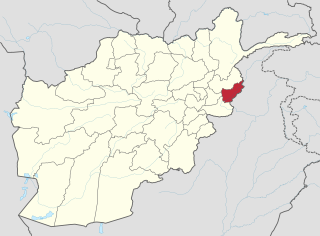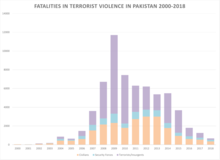
The Islamic Movement of Uzbekistan was a militant Islamist group formed in 1998 by Islamic ideologue Tahir Yuldashev and former Soviet paratrooper Juma Namangani; both ethnic Uzbeks from the Fergana Valley. Its original objective was to overthrow President Islam Karimov of Uzbekistan and create an Islamic state under Sharia; however, in subsequent years, it reinvented itself as an ally of Al-Qaeda. The group also maintained relations with Afghan Taliban in 1990s. However, later on, relations between the Afghan Taliban and the IMU started declining.

A series of occasional armed skirmishes and firefights have occurred along the Afghanistan–Pakistan border between the Afghan Armed Forces and the Pakistan Armed Forces since 1949. The latest round of hostilities between the two countries began in April 2007. Militants belonging to Tehrik-i-Taliban Pakistan and Jamaat-ul-Ahrar also use Afghanistan's territory to target Pakistani security personnel deployed along the border. The Diplomat says that the presence of terrorists belonging to Tehrik-i-Taliban Pakistan on Afghan soil is the reason for sporadic shelling of Afghanistan's territory by Pakistani security forces.

The insurgency in Khyber Pakhtunkhwa, also known as the War in North-West Pakistan or Pakistan's war on terror, is an ongoing armed conflict involving Pakistan and Islamist militant groups such as the Tehrik-i-Taliban Pakistan (TTP), Jundallah, Lashkar-e-Islam (LeI), TNSM, al-Qaeda, and their Central Asian allies such as the ISIL–Khorasan (ISIL), Islamic Movement of Uzbekistan, East Turkistan Movement, Emirate of Caucasus, and elements of organized crime. Formerly a war, it is now a low-level insurgency as of 2017.

Lashkar-e-Islam, also written as Laskhar-i-Islam, is a Deobandi jihadist terrorist group operating in Khyber District, Khyber-Pakhtunkhwa Province, Pakistan and the neighboring Nangarhar Province, Afghanistan.

The Pakistani Taliban, formally called the Tehreek-e-Taliban-e-Pakistan, is an umbrella organization of various Islamist armed militant groups operating along the Afghan–Pakistani border. Formed in 2007 by Baitullah Mehsud, its current leader is Noor Wali Mehsud, who has publicly pledged allegiance to the Afghan Taliban. The Pakistani Taliban share a common ideology with the Afghan Taliban and have assisted them in the 2001–2021 war, but the two groups have separate operation and command structures.
Ehsanullah Ehsan is a former spokesman of Tehreek-e-Taliban Pakistan (TTP) and later Jamaat-ul-Ahrar. As a spokesperson of the groups, Ehsan would use media campaigns, social media networks and call up local journalists to claim responsibility for terrorist attacks on behalf of the groups. He was initially a spokesman for the Tehreek-e-Taliban Pakistan (TTP). In 2014, he left TTP after he had developed ideological differences with the TTP leadership following the appointment of Fazlullah as the leader of the group. He later co-founded Jamaat-ul-Ahrar and became its spokesman. In 2015, as a spokesman of Jamaat-ul-Ahrar, he condemned Fazlullah-led Tehrik-e-Taliban attack on a school in Peshawar.
Chaudhary Aslam Khan Swati was a Pakistani police officer. From 2005 to 2014 Aslam arrested and killed terrorists, gangwar-criminals, target killers and extortionists belonging to the Tehrik-i-Taliban Pakistan (TTP), Balochistan Liberation Army (BLA), TMP, Lashkar-e-Jhangvi (LJ), Lashkar-e-Taiba (LeT) and Sipah-e-Sahaba Pakistan (SSP). On 9 January 2014, he was killed in a bomb blast carried out by the TTP.
On 8 June 2014, 10 militants armed with automatic weapons, a rocket launcher, suicide vests, and grenades attacked Jinnah International Airport in Karachi, Pakistan. 36 people were killed, including all 10 attackers, and 18 others were wounded. The militant organisation Tehrik-i-Taliban Pakistan (TTP) initially claimed responsibility for the attack. According to state media, the attackers were foreigners of Uzbek origin who belonged to the Islamic Movement of Uzbekistan (IMU), an Al Qaeda-linked militant organisation that works closely with TTP. The TTP later confirmed that the attack was a joint operation they executed with the IMU, who independently admitted to having supplied personnel for the attack.

Operation Zarb-e-Azb was a joint military offensive conducted by the Pakistan Armed Forces against various militant groups, including the Tehrik-i-Taliban Pakistan (TTP), the Islamic Movement of Uzbekistan, the East Turkestan Islamic Movement, Lashkar-e-Jhangvi, al-Qaeda, Jundallah and Lashkar-e-Islam. The operation was launched on 15 June 2014 in North Waziristan along the Pakistan-Afghanistan border as a renewed effort against militancy in the wake of the 8 June attack on Jinnah International Airport in Karachi, for which the TTP and the IMU claimed responsibility. As of 14 July 2014, the operation internally displaced about 929,859 people belonging to 80,302 families from North Waziristan.
The 2014 Quetta airbase attack occurred on 15 August 2014, when approximately 13 Tehrik-i-Taliban militants attempted to storm two airbases of the Pakistan Army and Pakistan Air Force; PAF Base Samungli and Khalid Airbase, both located in Quetta, Balochistan, Pakistan. The attack was largely unsuccessful as Pakistani security forces foiled the attempt following a major armed engagement between the two sides which resulted in the deaths of 12 militants, while 12 people were injured, including one attacker and 11 security personnel.

Jamaat-ul-Ahrar was a terrorist organization that split away from Tehrik-i-Taliban Pakistan in August 2014. The group came to prominence after it claimed responsibility for the 2014 Wagah border suicide attack. In August 2020, it merged back to TTP.

On 16 December 2014, six gunmen affiliated with the Tehrik-i-Taliban Pakistan (TTP) conducted a terrorist attack on the Army Public School in the northwestern Pakistani city of Peshawar. The terrorists, all of whom were foreign nationals, comprising one Chechen, three Arabs and two Afghans, entered the school and opened fire on school staff and children, killing 149 people including 132 schoolchildren ranging between eight and eighteen years of age, making it the world's fifth deadliest school massacre. Pakistan launched a rescue operation undertaken by the Pakistan Army's Special Services Group (SSG) special forces, who killed all six terrorists and rescued 960 people. In the long term, Pakistan established the National Action Plan to crack down on terrorism.

2014 Kunar Offensive refers to a 2014 armed conflict of the War in Afghanistan, between the Afghan Army and a terrorist group, Tehrik-i-Taliban Pakistan (TTP). It occurred in the Dangam district of eastern Kunar province, in Afghanistan bordering on Pakistan.

On 13 May 2015, eight gunmen attacked a bus travelling in Safoora Goth, Karachi, Sindh in Pakistan. The shooting left at least 46 people dead. All of the victims were of the Ismaili Shia Muslim minority, suggesting the attack was a targeted killing of sectarian nature.
The 2015 Camp Badaber attack occurred on 18 September 2015, when 14 Tehrik-i-Taliban Pakistan (TTP) militants attempted to storm Camp Badaber, a Pakistan Air Force base located in Badaber, Khyber Pakhtunkhwa, Pakistan. The attack killed 25–29 security personnel, including Captain Asfandyar Bukhari of the Pakistan Army, who was responding to the attack as part of a quick-reaction force. All 14 militants were killed in combat with Pakistani forces, according to claims by security officials. The attack, claimed by the TTP to be in retaliation for the Pakistan Armed Forces' Operation Zarb-e-Azb, was the first of its kind in its intensity, and the well-armed TTP militants engaged Pakistani forces at Camp Badaber in a protracted battle that resulted in heavier losses than those inflicted in previous attacks on military installations. PAF Camp Badaber is located about 48 kilometres (30 mi) east of the Afghanistan–Pakistan border.
Saeed Anwar was born in Haider Khel Village of North Waziristan Agency. He was a member of Tehrik-i-Taliban Pakistan (TTP) with Maulana Sadiq Noor Group. He was a well known militant in North Waziristan. He was killing people, also Pakistani Army soldiers. In June 2014, when Pakistan military launched operation Zarb-e-Azb, He was escaped to Afghanistan.
Operation Radd-ul-Fasaad is a codename of a combined military operation by the Pakistani military in support of local law enforcement agencies to disarm and eliminate the terrorist sleeper cells across all states of Pakistan, started on 22 February 2017. The operation is aimed to eliminate the threat of terrorism, and consolidating the gains of Operation Zarb-e-Azb which was launched in 2014 as a joint military offensive. It is further aimed at ensuring the security of Pakistan's borders. The operation is ongoing active participation from Pakistan Army, Pakistan Air Force, Pakistan Navy, Pakistan Police and other Warfare and Civil Armed Forces managed under the Government of Pakistan. More than 375,000 operations have been carried out against terrorists so far. This operation has been mostly acknowledged after Operation Zarb e Azb.
On 14 July 2021, a bus carrying Chinese workers in the Dasu area of Upper Kohistan District, Pakistan, fell into a ravine after an explosion, killing 13 people, including nine Chinese citizens and four Pakistanis, and injuring 28 others.
Pakistan and Tehrik-i-Taliban Pakistan peace talks was a ceasefire negotiation between the Pakistani government and banned terrorist organization namely Tehrik-i-Taliban Pakistan. Its goal is ending a two-decades long war and hostilities in Pakistan. The talks are held in western Khost province of Afghanistan while the Taliban government played crucial role to bring both parties on the dialogue table. In October 2021 then-Pakistani prime minister Imran Khan expressed his view that "...if TTP surrender and accept Pakistan's law, then they will be free from charges." However, TTP denied the state of prime minister.









